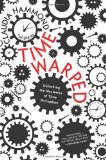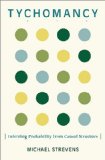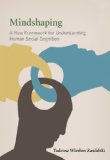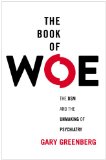May 28, 2013

Time Warped: Unlocking the Mysteries of Time Perception by Claudia Hammond (Harper Perennial, 2013)
(kindle ed.), (amazon.co.uk)
Book description from the publisher:
Drawing on the latest research from the fields of psychology, neuroscience, and biology, writer and broadcaster Claudia Hammond explores the mysteries of our perception of time in her book Time Warped.
Why does life seem to speed up as we get older? Why does the clock in your head move at a different speed from the one on the wall? Why is it almost impossible to go a whole day without checking your watch? Is it possible to retrain our brains and improve our relationship with it?
In Time Warped, Claudia Hammond offers insight into how to manage our time more efficiently, how to speed time up and slow it down at will, how to plan for the future with more accuracy, and she teaches how to use the warping of time to our own benefit.
Google books preview (Canadian edition):
See also: Author’s website
Comments (0)
- new books,psychology
May 17, 2013

The Art of Thinking Clearly by Rolf Dobelli (Harper, 2013)
(kindle ed.), (amazon.co.uk)
Book description from the publisher:
The Art of Thinking Clearly by world-class thinker and entrepreneur Rolf Dobelli is an eye-opening look at human psychology and reasoning — essential reading for anyone who wants to avoid “cognitive errors” and make better choices in all aspects of their lives.
Have you ever: Invested time in something that, with hindsight, just wasn’t worth it? Or continued doing something you knew was bad for you? These are examples of cognitive biases, simple errors we all make in our day-to-day thinking. But by knowing what they are and how to spot them, we can avoid them and make better decisions.
Simple, clear, and always surprising, this indispensable book will change the way you think and transform your decision-making—work, at home, every day. It reveals, in 99 short chapters, the most common errors of judgment, and how to avoid them.
See also: Author’s website
Comments (0)
- cognitive science,new books,psychology
May 13, 2013

Tychomancy: Inferring Probability from Causal Structure by Michael Strevens (Harvard University Press, 2013)
(amazon.co.uk)
Book description from the publisher:
Tychomancy—meaning “the divination of chances”—presents a set of rules for inferring the physical probabilities of outcomes from the causal or dynamic properties of the systems that produce them. Probabilities revealed by the rules are wide-ranging: they include the probability of getting a 5 on a die roll, the probability distributions found in statistical physics, and the probabilities that underlie many prima facie judgments about fitness in evolutionary biology.
Michael Strevens makes three claims about the rules. First, they are reliable. Second, they are known, though not fully consciously, to all human beings: they constitute a key part of the physical intuition that allows us to navigate around the world safely in the absence of formal scientific knowledge. Third, they have played a crucial but unrecognized role in several major scientific innovations.
A large part of Tychomancy is devoted to this historical role for probability inference rules. Strevens first analyzes James Clerk Maxwell’s extraordinary, apparently a priori, deduction of the molecular velocity distribution in gases, which launched statistical physics. Maxwell did not derive his distribution from logic alone, Strevens proposes, but rather from probabilistic knowledge common to all human beings, even infants as young as six months old. Strevens then turns to Darwin’s theory of natural selection, the statistics of measurement, and the creation of models of complex systems, contending in each case that these elements of science could not have emerged when or how they did without the ability to “eyeball” the values of physical probabilities.
See also: Author’s website
Comments (0)
- new books,psychology
May 11, 2013

Mindshaping: A New Framework for Understanding Human Social Cognition by Tadeusz Wieslaw Zawidzki (MIT Press/Bradford Books, 2013)
(amazon.co.uk)
Book description from the publisher:
In this novel account of distinctively human social cognition, Tadeusz Zawidzki argues that the key distinction between human and nonhuman social cognition consists in our complex, diverse, and flexible capacities to shape each other’s minds in ways that make them easier to interpret. Zawidzki proposes that such “mindshaping” — which takes the form of capacities and practices such as sophisticated imitation, pedagogy, conformity to norms, and narrative self-constitution — is the most important component of human social cognition. Without it, he argues, none of the other components of what he terms the “human sociocognitive syndrome,” including sophisticated language, cooperation, and sophisticated “mindreading,” would be possible.
Challenging the dominant view that sophisticated mindreading — especially propositional attitude attribution — is the key evolutionary innovation behind distinctively human social cognition, Zawidzki contends that the capacity to attribute such mental states depends on the evolution of mindshaping practices. Propositional attitude attribution, he argues, is likely to be unreliable unless most of us are shaped to have similar kinds of propositional attitudes in similar circumstances. Motivations to mindshape, selected to make sophisticated cooperation possible, combine with low-level mindreading abilities that we share with nonhuman species to make it easier for humans to interpret and anticipate each other’s behavior. Eventually, this led, in human prehistory, to the capacity to attribute full-blown propositional attitudes accurately — a capacity that is parasitic, in phylogeny and today, on prior capacities to shape minds. Bringing together findings from developmental psychology, comparative psychology, evolutionary psychology, and philosophy of psychology, Zawidzki offers a strikingly original framework for understanding human social cognition.
Comments (0)
- cognitive science,culture,new books,philosophy of mind,psychology
May 2, 2013

One of Amazon’s Best Books of the Month in Nonfiction:
The Book of Woe: The DSM and the Unmaking of Psychiatry by Gary Greenberg (Blue Rider Press, 2013)
(kindle ed.), (amazon.co.uk)
Book description from the publisher:
For more than two years, author and psychotherapist Gary Greenberg has embedded himself in the war that broke out over the fifth edition of the Diagnostic and Statistical Manual of Mental Disorders—the DSM—the American Psychiatric Association’s compendium of mental illnesses and what Greenberg calls “the book of woe.”
Since its debut in 1952, the book has been frequently revised, and with each revision, the “official” view on which psychological problems constitute mental illness. Homosexuality, for instance, was a mental illness until 1973, and Asperger’s gained recognition in 1994 only to see its status challenged nearly twenty years later. Each revision has created controversy, but the DSM-5, the newest iteration, has shaken psychiatry to its foundations. The APA has taken fire from patients, mental health practitioners, and former members for extending the reach of psychiatry into daily life by encouraging doctors to diagnose more illnesses and prescribe more therapies—often medications whose efficacy is unknown and whose side effects are severe. Critics—including Greenberg—argue that the APA should not have the naming rights to psychological pain or to the hundreds of millions of dollars the organization earns, especially when even the DSM’s staunchest defenders acknowledge that the disorders listed in the book are not real illnesses.
Greenberg’s account of the history behind the DSM, which has grown from pamphlet-sized to encyclopedic since it was first published, and his behind-the-scenes reporting of the deeply flawed process by which the DSM-5 has been revised, is both riveting and disturbing. Anyone who has received a diagnosis of mental disorder, filed a claim with an insurer, or just wondered whether daily troubles qualify as true illness should know how the DSM turns suffering into a commodity, and the APA into its own biggest beneficiary. Invaluable and informative, The Book of Woe is bound to spark intense debate among expert and casual readers alike.
Google Books preview:
Comments (0)
- new books,psychology







